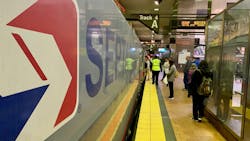SEPTA’s Board approves amended FY22 Capital Budget with additional $95 million
The Southeastern Pennsylvania Transportation Authority (SEPTA) Board approved an amended capital budget for Fiscal Year 2022 to account for the additional $95 million the authority will receive with the passage of the Bipartisan Infrastructure Law.
The Infrastructure Investment and Jobs Act, which was signed into law in November 2021, authorizes significant transit investments from the federal government including more than $33 billion for urbanized area formula programs and approximately $23 billion for State of Good Repair Programs over five years.
The added funding will allow SEPTA to increase its FY22 Capital Budget by slightly more than 15 percent, from $618.85 million to $713.85 million. SEPTA notes its expects an additional $500 million over the life of the bill, which will be reflected in the still developing FY23 Capital Budget and FY23-FY24 Capital Program.
“I want to thank the Southeastern Pennsylvania Congressional Delegation for their unwavering support of SEPTA,” said SEPTA Board Chairman Pasquale T. Deon Sr. “These critical infrastructure funds will help ensure that SEPTA can support this region through the pandemic recovery and beyond.”
Where the investment has been allocated
SEPTA will invest the added funds into its Projects of Significance, State of Good Repair and safety projects and ADA station projects.
An additional $40 million will go toward SEPTA’s Projects of Significance, which the authority had allocated $30 million in its previous FY22 Capital Budget. The added funds bring the total investment in significant projects for FY22 to $70.14 million. The increase will fund additional aspects of the authority’s Trolley Modernization, Bus Revolution Infrastructure Support and comprehensive planning and early actions for the 69th Street Transportation Center and Maintenance Complex.
SEPTA will invest an additional $24 million in State of Good Repair and safety projects with the added funds. Previously, the authority’s grade crossing program had been allocated $1 million in FY22. The grade-crossing program’s amended total is $4 million in FY22. Additionally, SEPTA will begin designing to rehabilitate bridges on the Chestnut Hill East and Chestnut Hill West Regional Rail Lines and bridges between Suburban Station and 30th Street Station, which the authority says serve as the lynchpin for its entire Regional Rail network. SEPTA will also initiate the design of signal system improvements on the Norristown High Speed Line (NHSL).
The third area where SEPTA will invest the added funds will be in its ADA station projects, which will see an extra $30 million allocated in FY22. The investment will allow SEPTA to begin design efforts for ADA accessibility improvements at 12 stations including eight along the Broad Street Subway, one on the NHSL and three on its Regional Rail network.
“I am proud of SEPTA’s commitment to accessibility, including making all Broad Street and Market-Frankford Line stations fully ADA accessible,” said SEPTA General Manager Leslie S. Richards. “Funding from the Bipartisan Infrastructure Law accelerates these and other initiatives and ensures that our service is equitable and inclusive.”
About the Author

Mischa Wanek-Libman
Group Editorial Director
Mischa Wanek-Libman is director of communications with Transdev North America. She has more than 20 years of experience working in the transportation industry covering construction projects, engineering challenges, transit and rail operations and best practices.
Wanek-Libman has held top editorial positions at freight rail and public transportation business-to-business publications including as editor-in-chief and editorial director of Mass Transit from 2018-2024. She has been recognized for editorial excellence through her individual work, as well as for collaborative content.
She is an active member of the American Public Transportation Association's Marketing and Communications Committee and served 14 years as a Board Observer on the National Railroad Construction and Maintenance Association (NRC) Board of Directors.
She is a graduate of Drake University in Des Moines, Iowa, where she earned a Bachelor of Arts degree in Journalism and Mass Communication.
